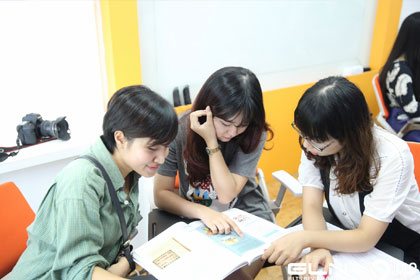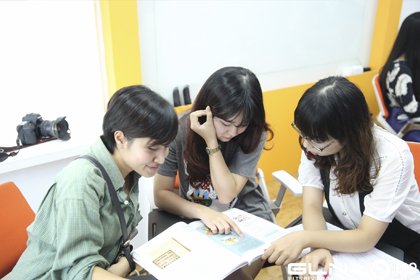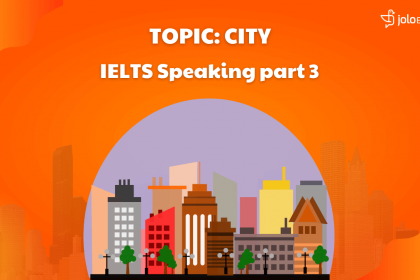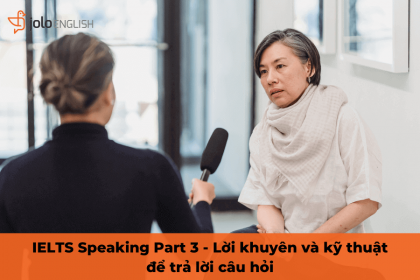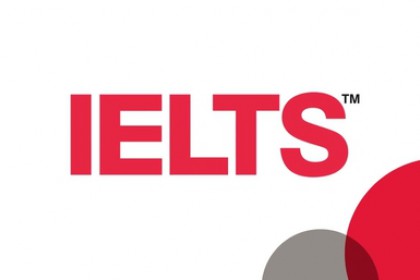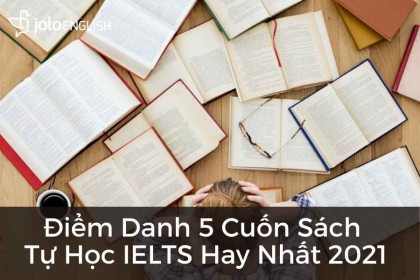History là một topic khiến khá nhiều thí sinh e ngại khi gặp phải trong bài thi IELTS. Trên thực tế, từ vựng của chủ đề này không hề khó. Thí sinh thường cảm thấy “bí" khi vấp phải topic History hầu như là do việc thiếu kiến thức, hiểu biết về môn Lịch sử nên không có ideas gì để trả lời câu hỏi hoặc viết bài.
Trong bài viết này, bên cạnh việc tổng hợp từ vựng hữu ích như thường lệ, JOLO English sẽ cung cấp cho bạn một số gợi ý để ứng dụng các từ vựng này vào phần Speaking và Writing trong IELTS
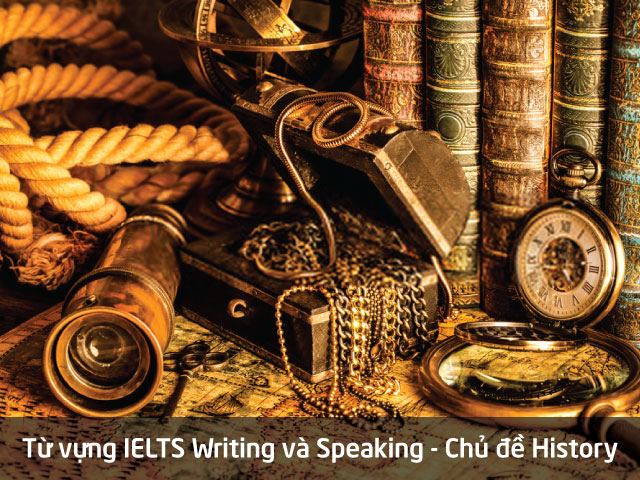
1. TỪ VỰNG HỮU ÍCH CHỦ ĐỀ HISTORY
- Bloody revolution: một cuộc cách mạng đẫm máu
VD: In the past, bloody revolution occurred because opposition and the government could not compromise.
- An indispensable part of school’s curriculum: một phần không thể tách rời trong chương trình học chính khoá
VD: Studying the history of the own nation is an indispensable part of school’s curriculum during students’ early education.
- Democracy: nền dân chủ
VD: Too much democracy in a country makes citizens undisciplined.
- Have thorough insight into: có kiến thức sâu rộng về thứ gì đó
VD: To study history is to have thorough insight into what happened in the past
- Fascism: chủ nghĩa phát xít
VD: Fascism became popular in Europe in early 20th century.
- Develop one’s patriotism: nuôi dưỡng lòng ái quốc
VD: History helps young people feel connected with the past and develop their patriotism.
- Genocide: diệt chủng
VD: I just couldn’t understand the reason why genocide had happened in the past.
- Defend their land against outside intruders: bảo vệ tổ quốc khỏi giặc ngoại xêm
VD: Children are taught about how their ancestors defend their land against outside intruders
- History repeats itself: lịch sử lặp lại
VD: It seems that history is going to repeat itself for that nation, more people will be killed for expressing their disgust to the government.
- Reclaim one’s sovereignty: đòi lại chủ quyền
VD: They will have the opportunity to vote on whether or not we reclaim our sovereignty.
- Nazi: phát xít
VD: We will never forget the brutality that Nazis had inflicted on Jews.
- Take pride in one's origin: Tự hào về cội nguồn tổ tiên của mình
VD: Those young children would take pride in their origin and treasure the life they have today.
- Overthrow a government: lật đổ chính quyền
VD: The citizens couldn’t bear the tyranny of their leader and decided to overthrow his government.
- Colonization: sự thuộc địa hoá
VD: Vietnam undergone hundreds of years under the colonization of foreign invaders.
- Traditional values and identity: các giá trị và bản sắc truyền thống
VD: Students need to understand their hometown’s traditional values and identity.
- Rewrite history: khiến cho người khác tin vào một sự kiện/chi tiết lịch sử mà thực tế chưa từng có thật
VD: Some countries rewrite history that the young generation become blinded by the truth.
- Share equal importance as: có tầm quan trọng tương đương
VD: Learning about world history shares equal importance as local one
- The course of history: tiến trình lịch sử
VD: The invention of flying cars could change the course of history in terms of automobiles.
- Well-rounded perspective of life: cái nhìn toàn diện về cuộc sống
VD: Acquiring knowledge about the world’s past events equips students with a more well-rounded perspective of life.
- Tyranny: bạo chúa
VD: There are refugees simply because there is so much tyranny in some countries.
- Enhance their understanding about: mở mang hiểu biết về thứ gì đó
VD: Lessons about the World War or Feminism protest against women’s abuse and discrimination would help learners enhance their understanding about various aspects of the world.
- Uprising: khởi nghĩa
VD: We owe our freedom now to our countrymen in the past who braved themselves for holding massive uprising to overthrow the Spanish colonizers.
- Historical backgrounds: bối cảnh lịch sử
VD: Being taught about the other countries’ historical backgrounds would benefit young learners in their future career.
- Down memory lane: đã xảy ra cách đây rất lâu
VD: His 1998 memoir is a delightful trip down memory lane.
- Brings no relevant values to the present or future: không mang lại lợi ích gì cho hiện tại hoặc tương lai
VD: History is something that brings no relevant values to the present or future.
- Recollect: nhớ lại
VD: His efforts, she recollected many years later, were distinctly half-hearted.
- No guarantee of the accuracy of information obtained: không có sự chắc chắn về tính chính xác của thông tin
VD: Each historical events is interpreted differently based on different facts and perspectives, so there is no guarantee of the accuracy of information obtained.
- Occurrence: biến cố
VD: I cannot imagine that these two occurrences are isolated incidents.
- Depict the mistakes made in the past: mô tả lại sai lầm trong quá khứ
VD: History depicts the event made in the past, hence helping people to avoid similar ones in the future.
- Prominent: nổi bật, đáng chú ý
VD: A prominent neoconservative, he was a co-founder of Project for the New American Century.
- Cause tremendous damage to: gây ra tổn thất nặng nề cho thứ gì đó
VD: If, in many cases, historical documents were falsified, it would cause tremendous damage to people’s culture and religion.
- Like watching grass grow (idiom): một việc buồn chán, tẻ nhạt
VD: To me, learning about history is like watching grass grow.
- In this day and age: trong thời điểm hiện tại hoặc trong thời kỳ hiện đại
VD: Honestly speaking, I didn’t recognize the value of History classes before, but fortunately, in this day and age, I’m able to cherish the significance of this subject.
- Ancestors: tổ tiên
VD: History is not only a subject to me, it is also a source of invaluable information about our ancestors.
- Historical highlights: những sự kiện nổi bật trong lịch sử
VD: Vietnam war, which ends in 1975, is one of the historical highlights of our country.
- Pay tribute to: tưởng nhớ ai
VD: We have held annual celebration to pay tribute to those who sacrificed for the country.
- Prominent leader: vị lãnh tụ kiệt xuất
VD: President Ho Chi Minh is a prominent leader of our country.
- Historical figure: nhân vật lịch sử
VD: I have developed an interest in historical female figures such as Ba Trieu or Hai Ba Trung.
- Decisiveness: lòng kiên định
VD: He went through a lot of ups and downs but with his decisiveness and patriotism, he came back to save his homeland.
- Memorials: đài tưởng niệm
VD: Now there are many memorials of soldiers in several parts of Vietnam for people to honor one of the greatest men in the country's history.
2. BÀI MẪU IELTS WRITING CHỦ ĐỀ HISTORY
ĐỀ BÀI: Some people say history is one the most important school subjects. Other people think that, in today’s world, subjects like science and technology are more important than history. Discuss both these views and give your own opinion. Give reasons for your answer and include any relevant examples from your own experience or knowledge. Write at least 250 words.
There are many people who have called into question the importance in today’s world of subjects like history, which do not have an immediately discernible impact on most future careers. While I think that history should still be mandatory, more practical subjects related to technology and the arts are more needed in our evolving world.
The main reason that students should study some history in school is that it provides crucial insights into nations around the world that serve as springboards for later political beliefs. In America, students learn about the American Revolution, the constitution and the founding fathers periodically from elementary to high school. They learn about why the war started (so that the colonies could tax and govern themselves) as well as the great figures from history like George Washington, Thomas Jefferson, and Benjamin Franklin. Some of the principles students learn include the ideas of American exceptionalism, life, liberty and the pursuit of happiness, and the responsibility of citizens to vote in a representative democracy. Later in life, most people will lean liberal or conservative but still hold the same basic convictions about individual liberty and responsibility. By knowing the context in which these ideas emerged students can become adults with well-informed political beliefs and it will be more difficult for unscrupulous politicians to make false assertions about the past.
Although history should still be taught, the practical sciences and arts should be prioritised because these are more likely to have an impact on a person’s future career. Very few students will end up with careers in history, as historians or professors, but a large percentage will work in the arts and especially the sciences. For example, in Vietnam the most popular university majors are engineering, finance, and graphic design. If schools emphasise maths at school then this will better prepare them to make calculations in complex engineering projects or when working at a bank or accountancy firm. Even learning how to draw and use colors in art class is more useful for students because of the high demand for graphic designers on websites and advertisements. Countries that devote more of their educational budget towards these practical subjects will give students a head start on a potential future career and increase their chances of having a higher standard of living.
It is clear that in this case a moderate approach is best. School administrators should not remove history from the timetable but in my opinion they should devote more time and resources to the teaching of subjects related to technology and the arts. This will become ever more important as the tech industry continues to dominate the future job market.
PHÂN TÍCH BÀI MẪU
INTRODUCTION
There are many people who have called into question the importance in today’s world of subjects like history, which do not have an immediately discernible impact on most future careers. While I think that history should still be mandatory, more practical subjects related to technology and the arts are more needed in our evolving world.
Như thường lệ, câu đầu tiên bạn chỉ cần paraphrase lại đề bài. Sau đó, câu thứ 2 đề cập luôn đến quan điểm của bạn và trình bày nó một cách rõ ràng.
BODY PARAGRAPH 1
The main reason that students should study some history in school is that it provides crucial insights into nations around the world that serve as springboards for later political beliefs.
Câu đầu tiên khái quát ý của đoạn văn: history is important for later political views.
Từ vựng cần lưu ý:
- crucial insights: sự hiểu biết cần thiết
- springboards: bàn đạp
In America, students learn about the American Revolution, the constitution and the founding fathers periodically from elementary to high school.
Câu thứ 2 phát triển luận điểm ở câu 1 bằng một dẫn chứng cụ thể từ chính kinh nghiệm của người viết. Trong bài IELTS Writing Task 2, hãy sử dụng kinh nghiệm của chính bạn khi viết, bởi bạn sẽ hiểu rõ và có thể phân tích chính xác hơn.
Từ vựng cần lưu ý:
- constitution: hiến pháp
- founding fathers: những người sáng lập
They learn about why the war started (so that the colonies could tax and govern themselves) as well as the great figures from history like George Washington, Thomas Jefferson, and Benjamin Franklin. Some of the principles students learn include the ideas of American exceptionalism, life, liberty and the pursuit of happiness, and the responsibility of citizens to vote in a representative democracy.
Câu thứ 3 và 4 tiếp tục triển khai ý từ câu 2 một cách chi tiết hơn.
Từ vựng cần lưu ý:
- exceptionalism: ngoại lệ
Later in life, most people will lean liberal or conservative but still hold the same basic convictions about individual liberty and responsibility.
Câu 5 không chỉ bổ sung ý cho các câu trước, mà còn tóm gọn những lý lẽ vừa trình bày để kết nối trở lại với luận điểm chính.
Từ vựng cần lưu ý:
- conviction: sự phán quyết
By knowing the context in which these ideas emerged students can become adults with well-informed political beliefs and it will be more difficult for unscrupulous politicians to make false assertions about the past.
Câu 6 chốt đoạn bằng cách mở rộng thêm dẫn chứng ở trên, sau đó tổng kết lại ý toàn đoạn.
Từ vựng cần lưu ý:
- well-informed: có hiểu biết
- unscrupulous: vô đạo đức
- assertions: sự khẳng định
BODY PARAGRAPH 2
Although history should still be taught, the practical sciences and arts should be prioritised because these are more likely to have an impact on a person’s future career.
Câu này lại là 1 câu khái quát đoạn văn với luận điểm được trình bày rõ ràng: arts and sciences are more useful for students’ future careers.
Từ vựng cần lưu ý:
- prioritise: ưu tiên
Very few students will end up with careers in history, as historians or professors, but a large percentage will work in the arts and especially the sciences.
Câu 2 giải thích cho ý ở câu 1.
For example, in Vietnam the most popular university majors are engineering, finance, and graphic design. If schools emphasise maths at school then this will better prepare them to make calculations in complex engineering projects or when working at a bank or accountancy firm. Even learning how to draw and use colors in art class is more useful for students because of the high demand for graphic designers on websites and advertisements.
Câu 3, 4 và 5 cung cấp dẫn chứng để chứng minh cho luận điểm. Bạn hãy nhớ, IELTS Writing Task 2 nên rõ ràng, đủ ý, không cần trình bày dài dòng, vậy nên hãy đề cập đến dẫn chứng càng nhanh càng tốt và phân tích nó đầy đủ.
Từ vựng cần lưu ý:
- emphasis: nhấn mạnh, chú trọng
- accountancy firm: công ty kế toán
Countries that devote more of their educational budget towards these practical subjects will give students a head start on a potential future career and increase their chances of having a higher standard of living.
Câu 6 đề cập lại đến luận điểm chính một lần nữa và tổng kết đoạn văn.
CONCLUSION
It is clear that in this case a moderate approach is best.
Câu này khẳng định rằng: ý kiến của người viết trong bài essay này là trung lập chứ không hoàn toàn phản đối hoặc đồng thuận.
School administrators should not remove history from the timetable but in my opinion they should devote more time and resources to the teaching of subjects related to technology and the arts.
Câu 2 giải thích một lần nữa quan điểm của bài viết.
Từ vựng cần lưu ý:
- administrators: ban điều hành, quản trị
- devote: dành, cống hiến
This will become ever more important as the tech industry continues to dominate the future job market.
Câu 3 thêm thắt một chi tiết cuối cùng cho phần kết luận, đồng thời giúp mở rộng ý của toàn bài. Đây là 1 trong những chi tiết khiến bài essay này đáng giá Band 7.
3. BÀI MẪU IELTS SPEAKING CHỦ ĐỀ HISTORY
- IELTS SPEAKING PART 1
Do you like learning history?
To be honest with you, I have no interest in learning history. Back when I was still a student, history was one of the subjects I despised the most. Simply because it’s uninteresting – most of the time I needed to memorize a great amount of information about the significant events in the past. I think history isn’t my cup of tea.
Have you ever been to historical museums?
Yes I have been to some but it was down memory lane. As far as I can recollect in mind, it was a mandatory co-curricular activity back when I was in primary school. We always had an off-site visit to some historical museums within our city and to some nearby cities. Well, these days, I don’t visit any types of museums like others do since I am not a huge admirer of this type of pursuit.
When was the last time you read something about history?
I have to confess that I’m a non-reader. I’ve never enjoyed reading any books ever since I was in my primary school, reading books is like watching grass grow. I can appreciate a good written story in short bursts, but too many pages are a big no for me. Movies are my preferred medium of storytelling and it is an entertaining way to learn history.
Did you like history when you were young?
Back in the days, history was the one subject that me and my classmates got frightened of. Honestly speaking, I didn’t recognize the value of History classes before, but fortunately, in this day and age, I’m able to cherish the significance of this subject. Reading history books helps me understand the past, which in turn allows me to understand the present.
- IELTS SPEAKING PART 2
Describe a historical figure that you like the most.
You should say:
- Who this person is
- How do you know this person
- What did this person do
And explain why this person is your favourite.
Ok so a person from history I’m going to talk about today is Leonardo Da Vinci.
Leonardo Da Vinci was an Italian Renaissance polymath whose areas of interest included invention architecture, sculpting, science and there are so many more that I can’t remember them all right now. But in general he was a multi-talented man. Um … and he’s also considered one of the greatest painters of all time. And many historians and scholars regard Leonardo Da Vinci as a universal genius or a Renaissance man. And among his works the Mona Lisa is the most famous and duplicated portrait with ‘The Last Supper’ being the most reproduced religious painting of all time. And I think one – there was a historian – that I can’t remember the name – once said that “Leonardo Da Vinci went beyond his time” – that he could – he could think of inventions that were so advanced that most of his work and designs weren’t feasible during his lifetime, and most of his designs weren’t recognised or realised until 100 years later. During his time, which was like 500 years ago, he was able to conceptualise the flying machine, armored fighting vehicle and even concentrated solar power.
The reason why I admire him is because I think that he – I agree with all other historians and scholars that he was one of the greatest painters of all time and somehow I think his personality and – his personality was quite mysterious and remote in a way that it has made me more curious to learn more about him.
- IELTS SPEAKING PART 3
What do you think we can learn by studying events of the past?
I think we can learn a lot by studying history. Just as individual people learn from their mistakes, societies can learn from the mistakes made by previous governments or leaders. For example, from what I've read in the newspapers, many economists are looking back to the time of the Great Depression, around 80 years ago, in order to understand the financial crisis that is currently affecting many countries around the world. Even if we don't always learn from mistakes, I think it's fascinating to study history because it gives us an insight into who we are and where we come from.
What important events do you think might take place in the future?
It's really difficult to predict what will happen in the future; most of the big, historic events of the past would have been impossible to foresee. For example, I don't think that anyone living 100 years ago could have imagined that people would one day walk on the moon! If I had to guess what might happen in the future, I'd like to think that scientists will invent cures for diseases like cancer, and we'll all live longer.
Dù bạn không giỏi Lịch sử thì điều đó cũng không có nghĩa là bạn không thể trả lời các câu hỏi về chủ đề History trong bài thi IELTS. Hãy luyện tập cách ứng dụng nhuần nhuyễn các từ vựng này vào bài làm của mình, chắc chắn band điểm của bạn sẽ được cải thiện.
-----------------------------------------
Tìm hiểu thêm các khóa học tại GLN / JOLO English - Hệ Thống Trung Tiếng Anh và Luyện Thi IELTS chất lượng tại Hà Nội và HCM :
- Khóa học Luyện Thi IELTS tại Hà Nội và HCM
- Khóa học Tiếng Anh Giao Tiếp tại Hà Nội và HCM
- Khóa học Tiếng Anh cho trẻ em
Hệ Thống Trung Tâm Anh Ngữ GLN / JOLO:
- Hà Nội: (024) 6652 6525
- TP. HCM: (028) 7301 5555
- JOLO: Số 4, ngõ 54 Nguyễn Thị Định, Hà Nội
- JOLO: Số 27 Trần Đại Nghĩa, Hà Nội
- JOLO: Biệt thự B8, ngõ 128 Thụy Khuê, Hà Nội
- JOLO: Số 7, đường số 2, Cư Xá Đô Thành, Q.3, Tp.HCM
- JOLO: Số 2, tầng 1, tòa C2, Vinhomes Central Park, Q. Bình Thạnh, TP.HCM
- GLN: Tầng 1 & 12, Tòa nhà Handico Phạm Hùng, Mễ Trì, Từ Liêm, Hà Nội
- GLN: Tầng 1 & 8, Tòa nhà Coalimex 33 Tràng Thi, Hoàn Kiếm, Hà Nội




